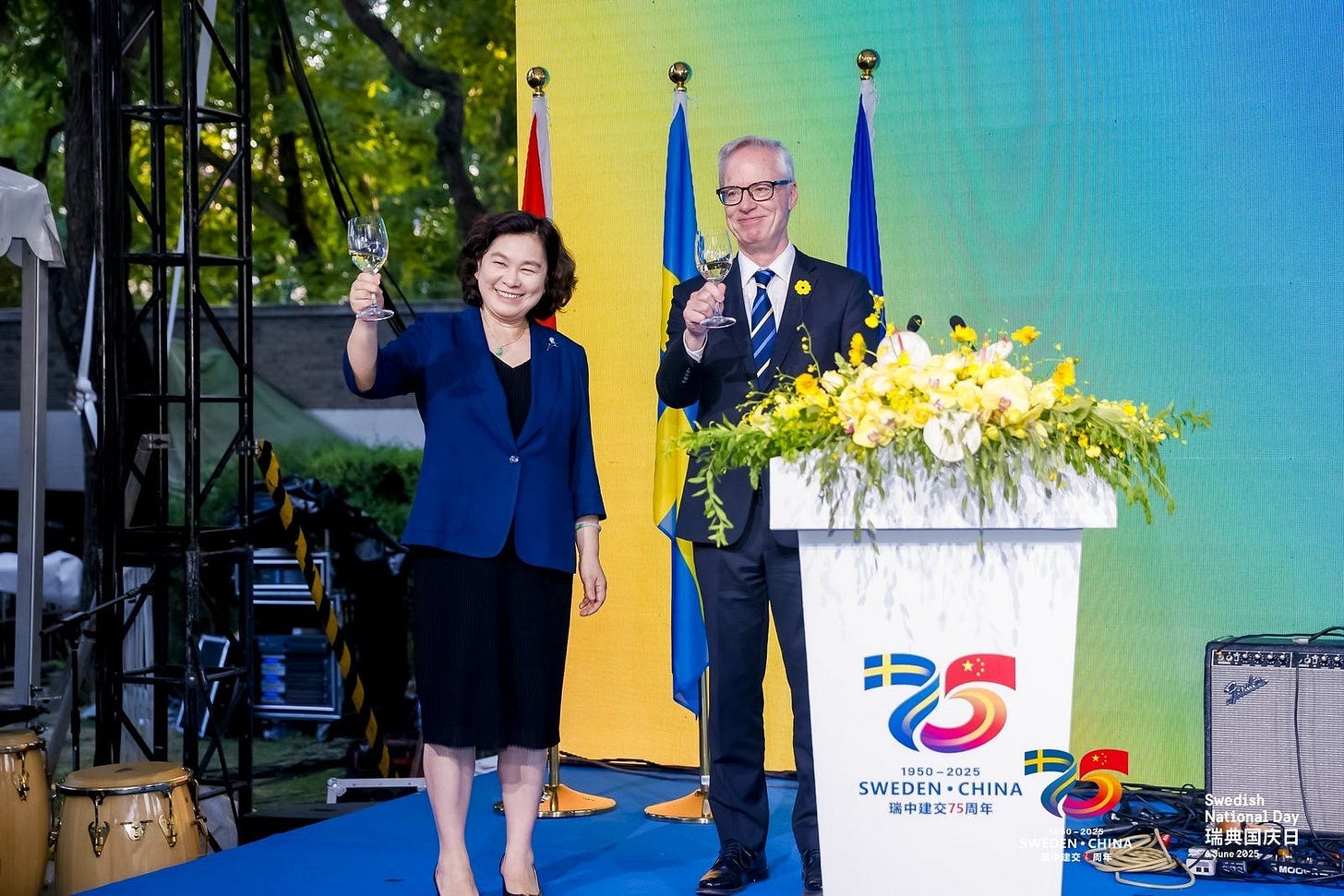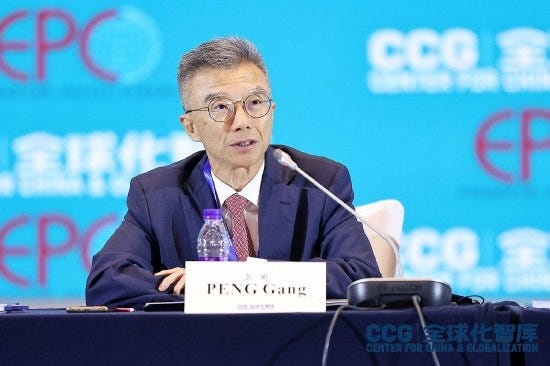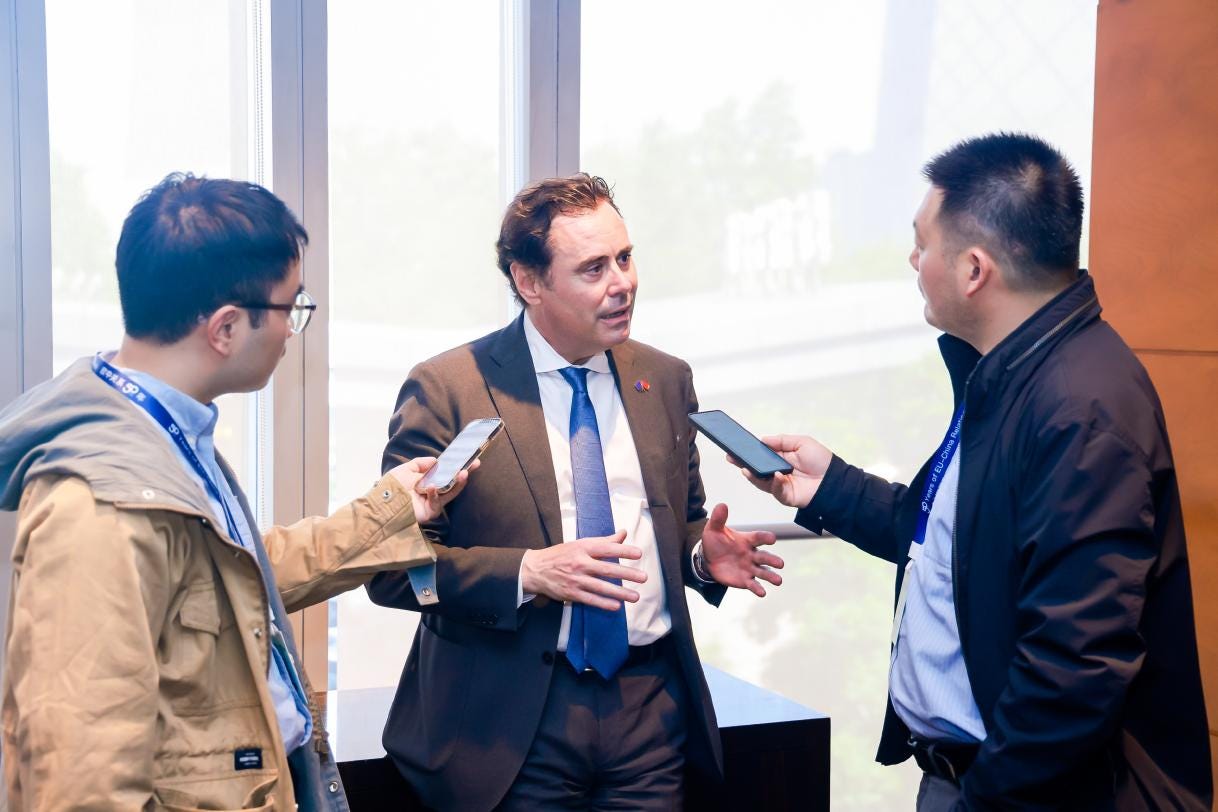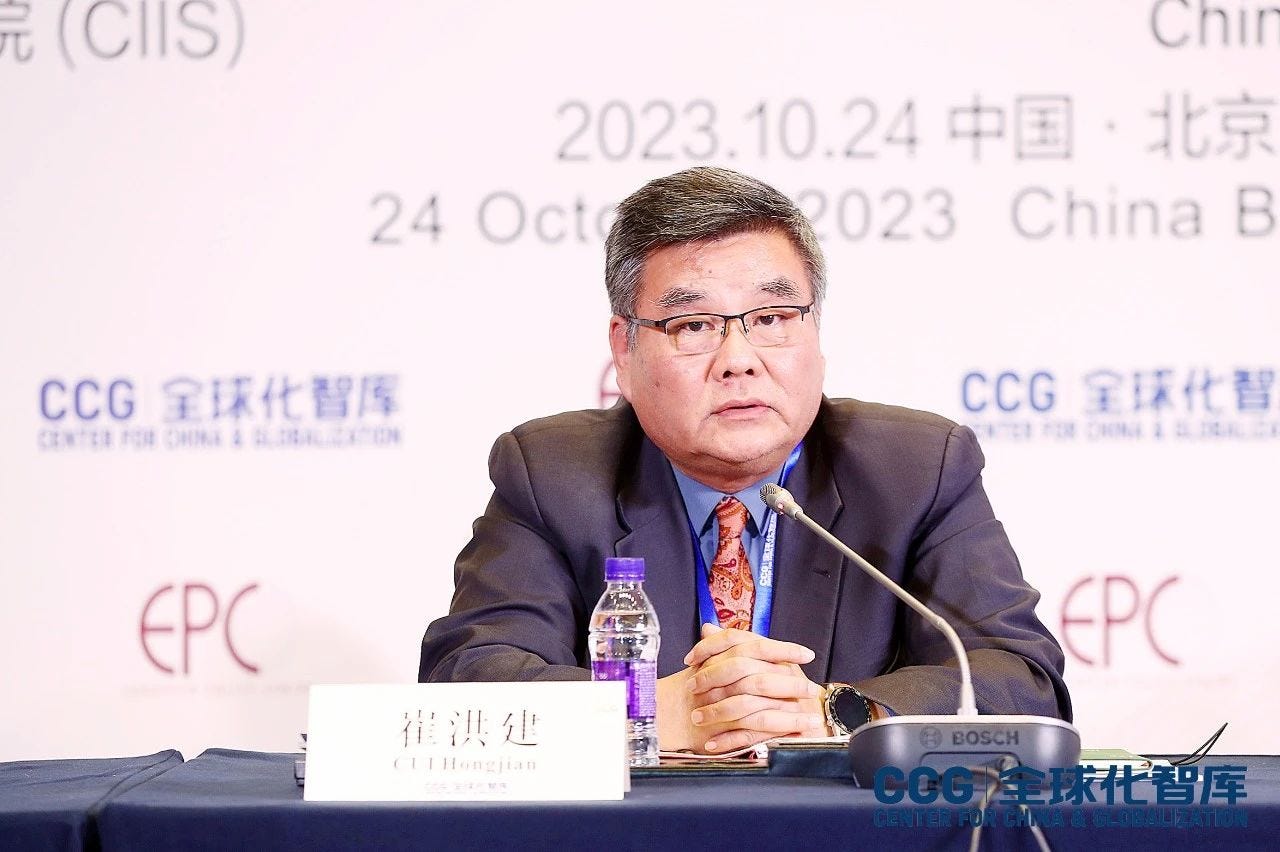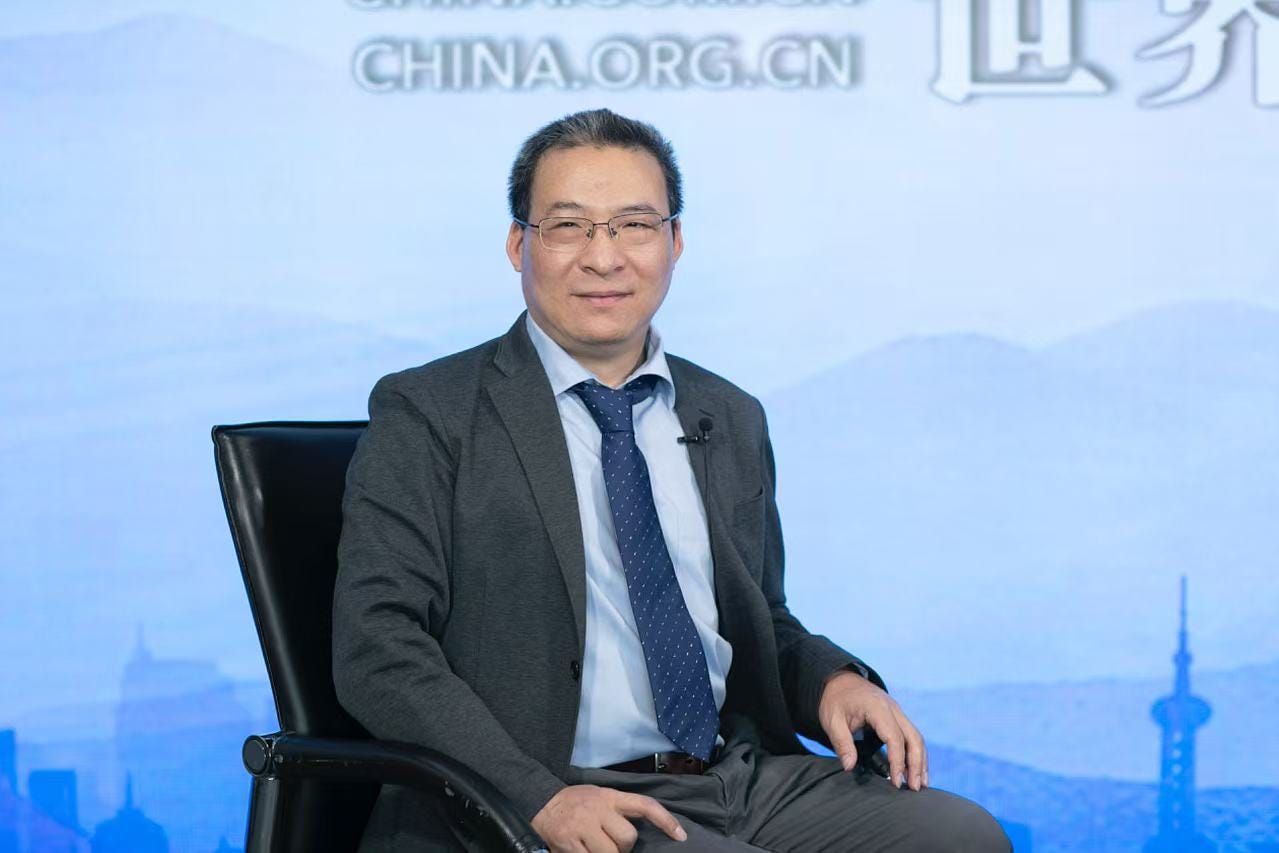As China & EU eye for possible July summit, where do their relations stand now?
Perhaps the most comprehensive roundup of China-EU track I & II diplomacy since May, plus what's dividing the two sides now.
A China-EU leaders' summit is now all but set for July 24–25, POLITICO reports:
BRUSSELS — European Union leaders will travel to China to meet their counterparts amid economic tensions and U.S. tariffs on July 24 and 25, diplomats told POLITICO.
…
Two EU diplomats told POLITICO that July 24 and 25 have now been set for the summit, with two other people close to the preparations confirming the timing. One of the diplomats said the first day of the meeting would be in Beijing and the second in Anhui, a province upstream from Shanghai centered on major industrial cities like Hefei and Wuhu.
So far, Beijing has stayed nearly silent on both the summit itself and the timing—a standard practice, as the country usually waits until about a week before any official diplomatic travel is publicly confirmed.
Few would dispute that 2025 is a big year for China-EU relations: the two sides are celebrating 50 years of formal diplomatic ties. Fewer still would deny that the relationship is now marked by rising friction and an ongoing search for a new equilibrium.
For your host, these past five decades have seen the two sides move through a nearly full cycle: initial discovery, closer engagement, rising suspicion, and now a push for recalibration.
Against this backdrop, all eyes will be on what, if anything, comes out of the (likely) leader summit.
Today's edition rounds up the key developments in China-EU relations since May 2025. Some analysis, but mostly legwork.
Here's how the piece is structured:
A chronological rundown of nearly all China-EU leader meetings and readouts since May;
A snapshot of recent Track I & II diplomacy events in Beijing since May;
Different concerns on the table, with opinions from leading Chinese experts.
Please note Ren Ke, a colleague of your host formerly with Xinhua's Europe Regional Bureau, contributes significantly to this piece.
Special thanks also go to two other colleagues Shi Yifei and Jiang Shengxiong for their support.
-- Yuzhe He
I. Bilateral leader interactions
May 6: Xi exchanges congratulations with Costa and von der Leyen
May 6 marked the exact 50th anniversary of China-EU diplomatic ties. On the day, Chinese President Xi Jinping exchanged congratulatory messages with European Council President Antonio Costa and European Commission President Ursula von der Leyen.
The readout of Chinese state news agency Xinhua is here.
That same day, China announced it would work with the EU to fully lift reciprocal exchange restrictions simultaneously.
May 9: Xi exchanges congratulations with King Carl XVI Gustaf of Sweden
On May 9, Chinese President Xi Jinping exchanged congratulatory messages with King Carl XVI Gustaf of Sweden to celebrate the 75th anniversary of the establishment of diplomatic relations between the two countries.
The readout from Chinese foreign ministry is here.
May 9-16: Chinese Vice Premier He Lifeng visits Switzerland and France
From May 9 to 12, Chinese Vice Premier He Lifeng visited Switzerland and held talks with Swiss leaders and relevant parties. China-U.S. Geneva talks also took place during this visit.
From May 12 to 16, He was in France, where he co-chaired with France the 10th China-France High Level Economic and Financial Dialogue.
Xinhua's press release is here.
May 17-20: Danish FM Lars Løkke Rasmussen visits China and meets with his Chinese counterpart
From May 17 to 20, Danish Foreign Minister Lars Løkke Rasmussen visited China and talked with his Chinese counterpart Wang Yi at May 19.
The readout from Chinese foreign ministry is here.
May 18-23: Chinese Vice Premier Liu Guozhong visits Switzerland and Belarus
From May 18 to 23, Chinese Vice Premier Liu Guozhong attended the 78th World Health Assembly in Geneva and visited Switzerland, and then visited Belarus and chaired the sixth meeting of the Chinese-Belarusian Intergovernmental Committee on Cooperation.
Xinhua's press release is here.
May 19: Chinese FM Wang Yi holds phone call with German Counterpart Johann David Wadephul
On May 19, Chinese foreign minister Wang Yi had a phone call with the new German Foreign Minister Johann David Wadephul.
The readout from Chinese foreign ministry is here.
May 19: Chinese FM Wang Yi holds phone call with Polish Counterpart Radoslaw Sikorski
On May 19, Chinese foreign minister Wang Yi had a phone call with Polish Foreign Minister Radoslaw Sikorski.
The readout from Chinese foreign ministry is here.
May 21-22: Dutch FM Caspar Veldkamp visits China and meets with Chinese counterpart
From May 21 to 22, Dutch Foreign Minister Caspar Veldkamp visited China and talked with his Chinese counterpart Wang Yi at May 22.
The readout from Chinese foreign ministry is here.
May 22: Xi holds phone call with French President Emmanuel Macron
On the afternoon of May 22, Chinese President Xi Jinping held a phone call with French President Emmanuel Macron at the latter's request.
The readout from Chinese foreign ministry is here.
May 23: Xi holds phone call with German Chancellor Friedrich Merz
On the afternoon of May 23, Chinese President Xi Jinping had a phone call with German Chancellor Friedrich Merz at the latter's request.
The readout from Chinese foreign ministry is here.
June 7-13: Chinese Vice President Han Zheng visits France and Spain
From June 7 to 13, Chinese vice president Han Zheng attended the UN Ocean Conference in Nice, France and visit Spain.
Han also addressed the UN General Debate, and the readout of Chinese foreign ministry is here.
II. Recent Track I & II diplomacy events in Beijing
May 14: Conference on EU-China relations hosted by EU Delegation to China
On May 14, the Delegation of the European Union to China hosted a one-day conference titled "Encouraging Balance, Upholding Commitments, Embracing Responsibilities." The conference brought together over 25 speakers from Europe and China, including senior diplomats and leading experts, to examine the past and future of EU-China relations across key areas such as geopolitics, trade, green transition, and global development.
Mr. Li Jian 李健, director general for European affairs with China's foreign ministry, delivered opening remarks. Your host translated his speech into English here.
May 22-24: 11th Annual China and Globalization Forum
From May 22-24, the Center for China and Globalization (CCG) and the Chinese People's Association for Friendship with Foreign Countries (CPAFFC) jointly convened the 11th Annual China and Globalization Forum, including a dedicated policy dialogue roundtable session themed "EU-China at 50: The State of the Bilateral Relationship in a Changing World," co-organized with the European Policy Centre (EPC). The event drew ambassadors to China from most EU member states, along with leading experts from both sides.
June 6: Celebration of 75th anniversary of China-Sweden diplomatic ties hosted by the Swedish Embassy in China
On June 6, the Swedish Embassy in China hosted an event to celebrate Sweden's National Day and the 75th anniversary of bilateral ties. It is encouraging to see that the once-strained China-Sweden relations have shown signs of improvement.
At the event, Swedish Ambassador to China Per Augustsson expressed his pleasure at the recent resumption of ministerial-level exchanges and the revival of the China-Sweden Trade Council. Chinese Vice Foreign Minister Hua Chunying also attended and delivered a speech. A Chinese expert present noted that it is uncommon for a vice ministerial-level official to attend such an occasion, viewing it as another signal of warming bilateral ties.
III. Different concerns on the table
It is always interesting to read the bilateral readouts, which reveals the distinct concerns of each side.
Xi-Macron call
Take Xi-Macron phone call, for instance. The key takeaways highlighted in the Chinese readout included enhancing bilateral cooperation across various sectors, fulfilling global responsibilities to uphold the post–World War II international order and address shared challenges, and strengthening China-EU relations.
What Macron shared on X, however, differed from China's official press readout. Topics he discussed with Xi included ensuring fair competition for Chinese and European companies, the issue of cognac, the ongoing Russia-Ukraine conflict, and the situation in the Middle East.
Xi-Merz call
Xi-Merz call was the similar. Xi spoke of strengthening China-Germany ties, proposing cooperation in multiple sectors, multilateralism and free trade, etc.
The German Federal Chancellery issued its version of the phone call press readout. It said that both emphasized their willingness to work together to address global challenges. Merz emphasized the importance of fair competition and reciprocity in economic relations. The Russia-Ukraine war was once again a topic of discussion.
Track I & II diplomacy events and opinions
Similar differences were also evident at recent Track I & II diplomacy events. At the aforementioned roundtable session of CCG's annual forum on May 23, Peng Gang 彭刚, former minister of the Chinese Delegation to the EU, noted achievements over the past half century and called for strengthened future cooperation while respecting differences.
In contrast, Fabian Zuleeg, Chief Executive and Chief Economist of the European Policy Centre, highlighted key aspects of the current geopolitical landscape, foremost among them "Russia's invasion of Ukraine," which is regarded by Europe as a direct challenge to its entire security architecture.
Jorge Toledo Albiñana, the EU Ambassador to China, told your hosts at the EU Delegation-organized event on May 14 that although EU-China relations have developed into one of the most important relations in the world, imbalances in trade and economic ties have also emerged. He again condemned Russia's aggression against Ukraine and called for adherence to the principles of the U.N. Charter.
Dr. Cui Hongjian 崔洪建, professor of the Academy of Regional and Global Governance at Beijing Foreign Studies University, told your hosts at the EU Delegation-organized event that China has repeatedly urged the EU to manage its expectations—it is not realistic to expect China to always take the same position as Europe. Mutual respect requires both sides to recognize and accept differences, and to seek a fair and rational understanding based on that foundation.
Since the outbreak of the Russia-Ukraine war in February 2022, this issue has consistently dominated Europe's political agenda.
Prof. Zhao Yongsheng 赵永升, Director of the French Centre for Economic Research at the University of International Business and Economics, currently a visiting scholar at Sorbonne University in Paris, told your hosts that it's normal that different countries inevitably prioritize their own national interests. For the EU, the Russia-Ukraine war is a matter of life and death.
"It's true that the EU and China are focused on different priorities at the moment. To strengthen ties, we can adhere to the principle of 'seeking common ground while shelving differences.' We don't need to talk about Ukraine or take a position. Instead, we can focus discussions with Europe on trade and investment. As long as we avoid issues of principle, other disputes can be set aside for now," said Zhao.
A possible summit itself holds significant symbolic value, showcasing China-EU friendship and unity. While it may not resolve specific issues, it could see the signing of several cooperation agreements, according to Zhao.





